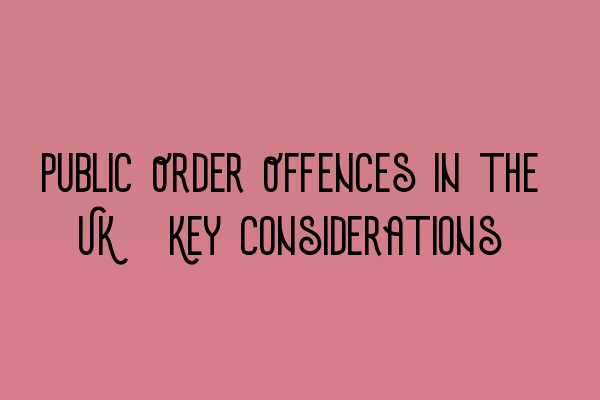Public Order Offences in the UK: Key Considerations
Public order offences are a significant aspect of the UK’s criminal law framework. Understanding the key considerations surrounding these offences is vital for both legal professionals and the general public alike. In this blog post, we will explore the various types of public order offences, their penalties, and the factors that courts take into account when dealing with such cases.
Types of Public Order Offences
Public order offences encompass a range of behaviors that disturb or jeopardize public order. Some common examples of public order offences include:
- Disorderly conduct: Engaging in disruptive or violent behavior in public spaces.
- Rioting: Participating in a violent public disturbance involving a group of people.
- Harassment: Unwanted or threatening behavior causing alarm or distress to another individual.
- Public intoxication: Being drunk or under the influence of drugs in a public place.
- Incitement to hatred: Encouraging hatred or violence against individuals based on their race, religion, or other protected characteristics.
- Disorderly assemblies: Organizing or taking part in an assembly that is likely to cause significant disruption or intimidation.
It is important to note that this list is not exhaustive, and public order offences may vary depending on the specific laws of each jurisdiction within the UK.
Potential Penalties
The penalties for public order offences can vary based on the severity of the offense. In less serious cases, individuals may receive a fine or a community order. However, in more severe cases, imprisonment may be imposed by the courts. The length of the sentence will depend on factors such as the nature of the offence, any aggravating factors present, and the defendant’s previous criminal history.
Furthermore, public order offences can have significant long-term consequences beyond the immediate penalties. Convictions for these offences can impact a person’s professional reputation, employment prospects, and travel opportunities. It is therefore crucial to seek professional legal advice in such cases to ensure the best possible outcome.
Factors Considered by the Courts
When dealing with public order offences, courts take various factors into consideration before reaching a verdict. Some of the key factors include:
- Intent: Courts will analyze whether the accused had the intention to cause public disorder or alarm.
- Level of harm: The extent of harm caused or likely to be caused to individuals or property.
- Provocation: Whether the accused was provoked by another individual’s actions or words.
- Role played: Courts examine the level of involvement or leadership exhibited by the accused in the commission of the offence.
- Previous convictions: Any previous convictions or criminal history of the accused may be taken into account during sentencing.
It is crucial to engage the services of an experienced criminal defense solicitor who can effectively advocate your case by addressing these factors in court. They can provide valuable guidance and legal representation throughout the legal process.
In conclusion, public order offences are a significant facet of the criminal law landscape in the UK. Understanding the types of offences, potential penalties, and the factors considered by the courts is vital for all individuals involved in such cases. If you require legal advice or representation for a public order offence, our team at SQE Criminal Law & Practice Law UK is here to help you navigate through the complexities of the legal system.
Related Articles:
SQE 1 Practice Exam Questions,
SQE 1 Practice Mocks FLK1 FLK2,
SQE 2 Preparation Courses,
SQE 1 Preparation Courses, and
SRA SQE Exam Dates.
